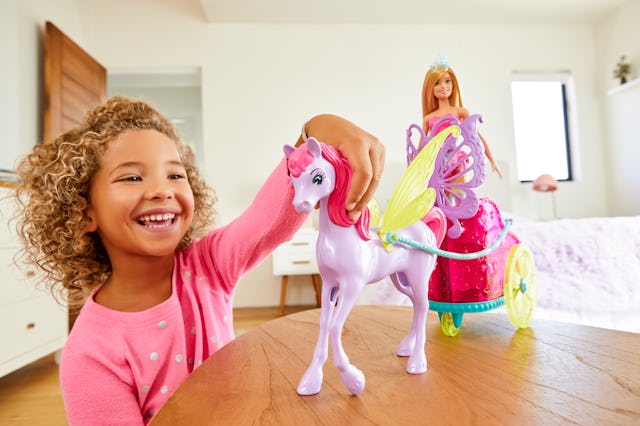5 Creative Ways Parents Can Use Doll Play to Teach Kids Empathy

Post written in partnership with Barbie®
We want our kids to learn empathetic behavior from a young age so they can become future leaders who care. The good news is empathy happens to be something we can teach and practice with our kids every day. According to findings from a new study by Cardiff University in collaboration with Barbie®, doll play activates brain regions that allow children to develop social processing skills like empathy.
With a little imagination, you (and Barbie!) can help build kids’ appreciation of what others might be feeling, while also exploring empathetic responses to those feelings. Here are a few ways to get started:
Take The Show On The Road
One of the best ways to help kids develop empathy is by encouraging them to get curious about the world around them. Try taking a little close-by road trip to somewhere they haven’t been before and bring Barbie along. While you’re there, help them notice new things and people – in a low-key, polite way, of course. Use the time in the car on the way home to ask them about the visit and what they thought was interesting. Ask if anything made them curious. Encourage them to notice differences as well as similarities. Exposure to a wide range of people and places inspires empathy so take full advantage of that “car ride chattiness” and let them talk about what they saw.
Check In Over Snacks
Listen, Barbie enjoys a hearty afternoon snack every bit as much as the rest of us. While your family may be familiar with talking over dinner about how the day went, there’s something especially low-pressure about chatting while you share a snack. Use this time to help kids name their own feelings as they describe how everything’s going in their day. Give Barbie a few easy questions too, and see where it goes…
Let Kids Care
Remember that empathy is not just understanding that others have feelings. It’s also the ability to imagine what those feelings might be, and then behaving in a way that demonstrates that understanding. So get down on the floor and let your kid guide free play while you suggest scenarios that encourage empathy. Maybe Barbie can say, “I’m sad today because my friend laughed at me when I said the wrong answer in class.” This kind of play lets kids imagine and try out different responses to see how they feel.
The “Two Kind” Rule
While playing together, establish a “two kind” rule: Barbie has to do two kind things each day. It might be demonstrating care for animals, babies, or a friend who isn’t feeling well. According to leading empathy researcher and educational psychologist Dr. Michele Borba, this kind of play invites kids to practice the “doing” part of empathy. Later, Barbie might be even able to suggest ideas for ways to show kindness toward others. (And yes, we know Barbie doesn’t technically “talk.” But we also know that in the hands of a kid, she totally does.)
Normalize Discussing Feelings
Kids aren’t always comfortable talking about their own feelings; direct questions about them can feel unfamiliar and even a little overwhelming. So as you’re tucking your kid into bed at night, you can both chat with Barbie about how her day went. Ask how she felt when she fell down at the playground. Recognizing and naming feelings is an important step in developing empathy and self-regulation. Role-playing situations make it easier for kids to talk about feelings without putting what might be an uncomfortable spotlight on themselves.
Empathy is an incredible tool for building resilience and developing kids’ ability to bounce back from tough situations. It’s also an important predictor of successful relationships with other people and a key part of resolving conflict.
Dr. Borba says, “It’s been shown that children who have developed empathy and social skills early in life can have better grades, stay in school longer and make healthier choices overall. Empathetic children might also be more likely to stand up for a child being bullied and try to engage and resolve the conflict. Understanding that kids can help develop these skills through playing with dolls like Barbie, is remarkable and a helpful tool for parents.”
For more resources and suggestions for how Barbie™ can help kids develop empathy and other social processing skills, visit Barbie/BenefitsofDollPlay.
Study was commissioned by Barbie (2020). Study was conducted with 42 children (20 boys and 22 girls) ages 4-8 years old with full data captured from 33 children.
This article was originally published on